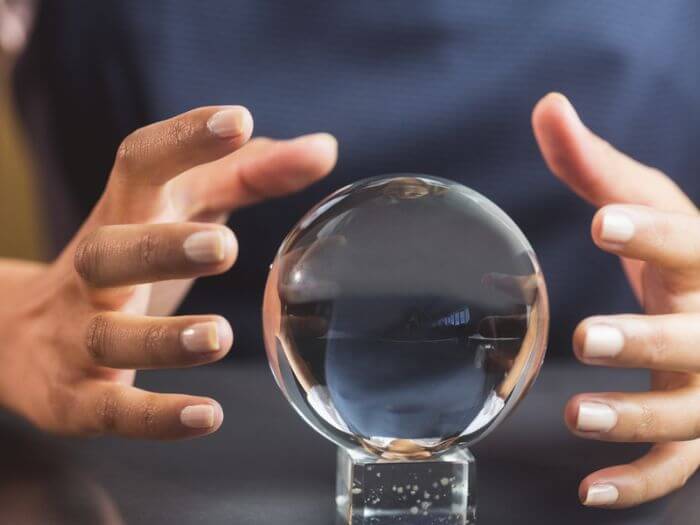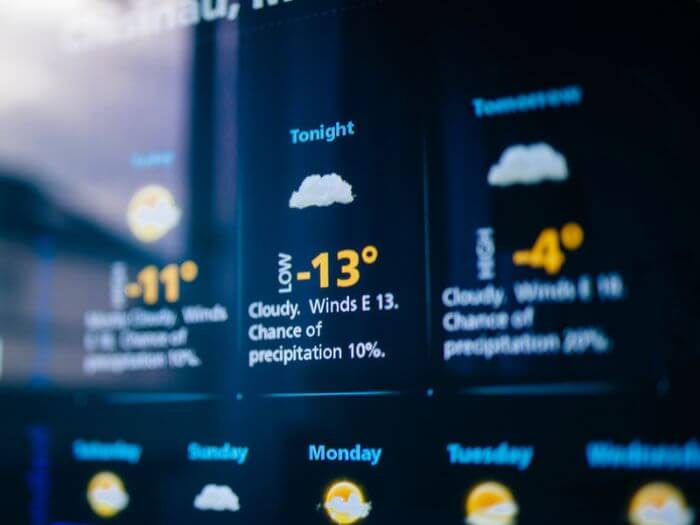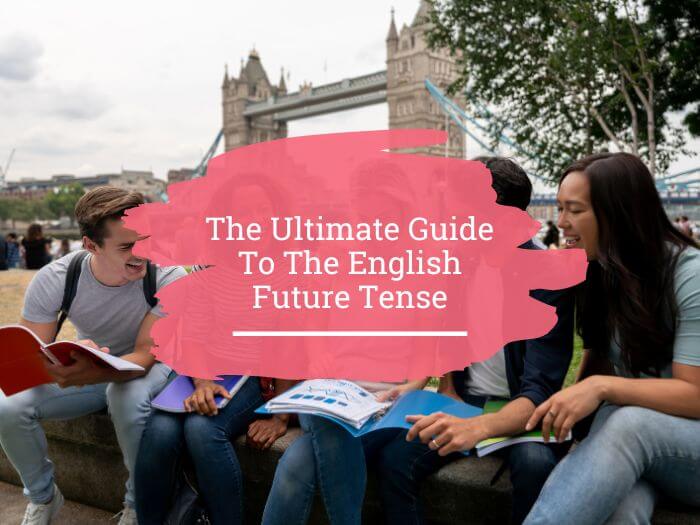There are many ways to talk about the future in English:
- Will
- Be going to
- Present continuous
- Present simple
- Future perfect simple
- Future perfect continuous
- Future continuous
In this post, you’re going to learn all of them!
That's right, there isn't one English future tense that you can learn. Instead, there are different forms we use to talk about the future in English.
Let’s begin.
If you like, you can use the table below to jump to the section of the post that interests you most.
Table of Contents
Future With “Will”

Using “will” is the most frequent way to talk about the future.
“Will” is used to make predictions, talk about future facts, make offers and announce decisions made at the moment of speaking.
Let’s look at each case.
Making Predictions
A prediction is a statement that says what you think will happen in the future.
If the prediction isn't based on some present evidence, grammar books usually say you should use “will”. On the other hand, if there is some evidence, you should use “be going to”.
In the real world, however, people use “will” and “be going to” interchangeably whether they have evidence for their predictions or not.
So don’t worry about this too much.
Here are some example dialogues using “will” for predictions:

- Sarah: “I heard there's a big storm coming tomorrow.”
- Jake: “Oh, really? Do you think it will affect our weekend plans?”
- Sarah: “No, I don’t think it will.”
- Lisa: “I'm not feeling well today.”
- Mark: “Take it easy. I'm sure you will feel better after a good night's rest.”
- Alex: “The team is playing so well lately.”
- Emily: “I agree. I won’t be surprised if they make it to the finals.”
- Chris: “I'm thinking of starting a new fitness routine.”
- Ashley: “That's a great idea! I'm sure you will feel more energetic in no time.”
- Ryan: “I have a job interview next week.”
- Megan: “You've prepared well. I'm confident you will do great!”
Talking About Future Facts

No one has a crystal ball to know what will happen in the future but we can consider certain future events as facts.
However, the difference between a future fact and a prediction can be slippery because, in reality, all statements about the future are, to some extent, predictions.
Look at these examples:
- Tony: “The concert is at 7 PM tomorrow.”
- Olivia: “Perfect! I’ll be there early to grab good seats.”
- Jessica: “Our flight to Paris leaves at 11 AM, not at 6 AM.”
- Brian: “That’s great news. I’ll have more time to sleep!”
- Alex: “The sun will rise at 6:30 AM.”
- Sarah: “Let's plan to watch the sunrise together then.”
- Mark: “The museum opens at 10 AM.”
- Laura: “Great! We will have plenty of time to explore the exhibits.”
Making Offers And Announcing “Immediate” Decisions

There are times when you offer to do something for someone or make an instant decision and immediately announce it to others. That’s when you’ll need “will”.
Have a look at some example dialogues:
- Sarah: “I'm so tired.”
- Chris: “Okay, I’ll cook dinner tonight so you can relax.”
- Mark: “I can't find my umbrella and it's raining.”
- Lisa: “No worries, I’ll lend you mine for the day.”
- Alex: “I need someone to help with the presentation.”
- Emily: “I’ll help you, no problem.”
- David: “What are you going to eat?”
- Megan: “Let me look at the menu. Okay, I’ll have the soup.”
- Jessica: “I forgot my lunch at home.”
- Brian: “I’ll grab something for you on my way.”
Form
| Affirmative |
| Subject + will + base form of the verb |
| She will / She’ll visit the museum tomorrow |
| Negative |
| Subject + will not (won't) + base form of the verb |
| She won’t visit the museum tomorrow |
| Question |
| Will + subject + base form of the verb |
| Will she visit the museum tomorrow? |
Note that “will” is the same for every subject pronoun (I will, she will, etc.)
Be Going To
“Be going to” is usually used to make predictions (based on some present evidence) and talk about future plans/intentions.
Making Evidence-Based Predictions

Sometimes you make predictions because you see, hear or feel something or have some other sort of factual evidence.
The classic example sentence for this is “Look at those dark clouds! It’s going to rain soon!”
But, as I said before, people often use either “will” or “be going to” when making evidence-based or non-evidence-based predictions.
So you can say:
- “The weather forecast predicts sunshine all week, so it will be / it’s going to be a great time for outdoor activities.”
- “I can feel the tension in the air. Something unexpected is going to happen / will happen soon.”
- “Look at those storm clouds gathering. It's going to be / it’ll be a rough night.
- “She just called and said she's running late. She will probably be / she’s probably going to be here in the next 10 minutes.”
- “Based on the economic indicators, it's going to be / it’ll be a challenging year for small businesses.”
Talking About Future Plans / Intentions

Let’s say you made a plan to go to Paris next year. A couple of days after making that plan, you see a friend and you want to tell him about your plan. You can say, “Did I tell you? Next year I will go to Paris!”
That’s okay. Your friend would have zero problems understanding what you’re saying. In spoken English, people use “will” to talk about plans too.
However, “be going to” is the most appropriate form when talking about plans. If you think about it, going to Paris is not a decision you made when you spoke to your friend but it’s one you made some time before announcing it to him.
So “Next year I’m going to visit Paris” would be the best form.
Some other examples for you:
- “In a few months, we are going to move to a bigger apartment.”
- “They aren’t going to renovate the kitchen next spring.”
- “She's going to start her own business after finishing her degree.”
- “Are we going to celebrate our anniversary at that fancy restaurant?”
- “I think I'm going to take a vacation in the mountains next year.”
Form
| Affirmative |
| Subject + am/is/are + going to + base form of the verb |
| I am going to visit Paris next year |
| Negative |
| Subject + am not/is not/are not (isn't/aren't) + going to + base form of the verb |
| She’s not going to visit Paris next year |
| Question |
| Am/Is/Are + subject + going to + base form of the verb |
| Are they going to visit Paris next year? |
In spoken English the pronunciation of “going to” is /ˈgə.nə/ while in very informal writing “going to” is often spelt as “gonna“.
Also, when the main verb of the sentence is “go”, you can safely avoid the use of “be going to” and use the present continuous instead. So “I’m going to go to the cinema” becomes “I’m going to the cinema”.
Let’s look at the present continuous now.
Present Continuous
You may already know that the present continuous (I’m eating right now, she’s reading lots of books these days, they’re watching TV at the moment, etc.) is used to talk about temporary things that are happening at the moment of speaking.
That’s one way we use it but you can also use it to talk about future arrangements.
Let’s read an example dialogue to clarify this:
Alex: “Hey, what are your plans for the weekend?”
Jordan: “Well, I'm meeting Sarah for lunch on Saturday. She’s free and she agreed to hang out with me.
Alex: “That sounds fun!”
Jordan: “Yeah we're also visiting the new art exhibition at the museum. I bought the ticket yesterday at a discounted price. It’ll be awesome.”

As you can see, future arrangements are definite plans.
Jordan and Sarah have already arranged to see each other. Jordan has also bought tickets for the museum. The visit was planned and arranged, so he uses the present continuous to talk about it.
Here are some other example sentences:
- “We are flying to Paris next week for a vacation.”
- “She’s taking her child to the cinema tomorrow evening.”
- “I'm not attending the conference next month.”
- “Are you coming to the beach party with us this Friday?”
- “Is she visiting her family over the holidays?”
Form
| Affirmative |
| Subject + am/is/are + verb in ing |
| I’m watching a movie with my friends tonight. |
| Negative |
| Subject + am/is/are + not + verb in ing |
| He’s not watching a movie with my friends tonight. |
| Question |
| Am/Is/Are + subject + verb in ing |
| Are they watching a movie with us tonight? |
Present Simple

I’m sure you already know that the present simple is used to talk about facts, truths and things that are considered certain at all times.
For example:
- I am British.
- This post is about the English future tense.
- Storylearning helps people learn languages through the power of stories.
The same applies to future events. When we see them as facts (even though nothing is ever certain about the future) we can use the present simple.
That’s why this tense is often used to talk about scheduled events.
Some examples:
- His birthday is on Friday this week. (a fact about the future)
- I have an exam next month. (a fixed arrangement that’s been scheduled)
- The train from Paris arrives at 3 pm today. (an event on a timetable)
- What time does their flight leave? (a schedule)
That’s it.
The present simple to talk about the future is indeed…simple!
Form
| Affirmative | Negative | Question | |
| I/You/We/They | I work tomorrow | I don’t work tomorrow | Do you work tomorrow? |
| He/She/It | She works tomorrow | She doesn’t work tomorrow | Does she work tomorrow? |
Future Perfect Simple

We live in the present. But we can think about the future. And we can also look back to the past from a point in the future. That’s when we use the future perfect simple.
Okay, we need an example, I know.
Let’s say my wife and I got married on 1st November 2013. Let’s also imagine today is 1st November 2023. Next month, on 1st December 2023, if someone asks me, “How long have you been married?” I will say, “I’ve been married for ten years.”
Right?
Today, however, is still the 1st of November. I can’t say I’ve been married for ten years yet. But I can go to 1st December 2023 with my mind and look back from that point.
And I can also talk about events that started before the 1st of December (my marriage) but are still connected to the present (the present = 1st of December).
So today I can say, “Next month I will have been married for ten years.”
This is when we use the future perfect.
Some other examples:
- By 5 PM tomorrow, I will have finished my work.
- They will have completed the construction of the new bridge by the end of next year.
- Next year, I’ll have been here for over a decade.
- By the time you arrive, I will have prepared dinner.
- She will have read the entire novel before the book club meeting.
- By the time the movie starts, they will have sold all the tickets.
Form
| Affirmative |
| Subject + will have + past participle (verb) |
| Next month I’ll have been in this city for over a decade. |
| Negative |
| Subject + will not have (won't have) + past participle (verb) |
| They won't have completed the construction by the end of next year. |
| Question |
| Will + subject + have + past participle (verb)? |
| Will you have finished your work by 5 PM tomorrow? |
Future Perfect Continuous
The use of the future perfect continuous is similar to that of the future perfect simple.
We also use the future perfect continuous when we are looking back to the past from a point in the future. But if we use the continuous form is because we want to emphasise the length or duration of an activity or event.
- By the time she arrives, we will have been waiting for her at the airport for three hours.
- Next month, they will have been living in that house for a decade.
- By the end of the week, he will have been working on the project non-stop for seven days.
- In a year, I will have been studying French for ten years.
- By the time the concert starts, the band will have been rehearsing for weeks.
- By the time you reach your destination, the sun will have been shining for hours.
- When we meet again, it will have been years since our last reunion.
Form
| Affirmative |
| Subject + will have been + present participle (verb + -ing) |
| By this time next week, I will have been working on this project for six months. |
| Negative |
| Subject + will not have been (won't have been) + present participle (verb + -ing) |
| By the end of the day, she won't have been working on the report for more than a few hours. |
| Question |
| Will + subject + have been + present participle (verb + -ing)? |
| How long will they have been waiting for us when we arrive? |
Future Continuous

The future continuous is used to express actions or events that will be ongoing at a specific point in the future. It works like the present continuous except that we use it for the future.
Here are some typical examples:
- “This time next week, I’ll be lying on the beach.”
- John: “Are you free at 5 PM this afternoon?”
- Mark: “No, sorry. I have a meeting with a client at 4:45 PM so I will be discussing business with him in my office at that time.”
- “She will not be working on Tuesday.”
- “Will you be teaching tomorrow at 2 PM?”
Form
| Affirmative |
| Subject + will be + present participle (verb + -ing) |
| I will be studying for my exam at 8 PM tonight. |
| Negative |
| Subject + will not be (won't be) + present participle (verb + -ing) |
| They won't be flying to Paris until next week. |
| Question |
| Will + subject + be + present participle (verb + -ing)? |
| What will they be doing this time tomorrow? |
English Future Tense FAQ
What are the 4 future tenses?
The four future tenses in English are: Simple Future (will do), Future Continuous (will be doing), Future Perfect (will have done), and Future Perfect Continuous (will have been doing). Each one shows a different aspect of future time.
Does English have a future tense?
No, English expresses the future using an auxiliary verb like “will” or a future form like “be going to”, rather than a distinct verb form. Future meaning is also often shown with context or time expressions.
What are the 3 future tenses?
Commonly, the three main future tenses are: Simple Future, Future Continuous, and Future Perfect. Some sources include Future Perfect Continuous as a fourth tense.
What is the future tense and example?
The future tense describes something that will happen later. Example: She will travel to Japan next month.
English Future Tense
Well done! You've reached the end of this grammar guide about the “English future tense” or rather future forms in English!
Now that you have seen multiple examples of future forms, try to notice them while watching a movie in English, listening to music, reading English books, or conversing in English.
In other words, learn to talk about the future while having fun.
Having fun is one of the best ways to learn any language and you can use the StoryLearning method for that.
Not only is this enjoyable and entertaining, but it’ll make learning and remembering future forms much easier than studying pages and pages about them in grammar books.
You’ll notice these verb structures in the context of interesting and gripping short stories in English that will help you learn them.
I wish you all the best in your future!

Olly Richards
Creator of the StoryLearning® Method
Olly Richards is a renowned polyglot and language learning expert with over 15 years of experience teaching millions through his innovative StoryLearning® method. He is the creator of StoryLearning, one of the world's largest language learning blogs with 500,000+ monthly readers.
Olly has authored 30+ language learning books and courses, including the bestselling "Short Stories" series published by Teach Yourself.
When not developing new teaching methods, Richards practices what he preaches—he speaks 8 languages fluently and continues learning new ones through his own methodology.










































